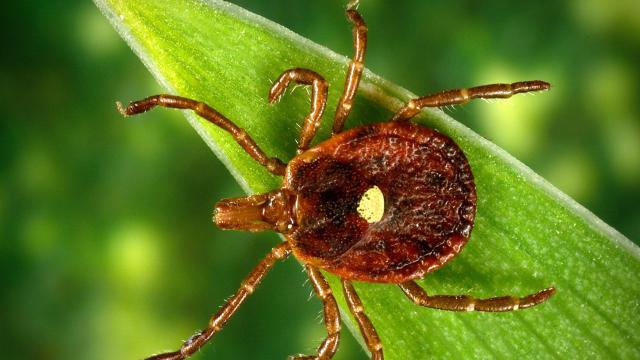One of the strangest side-effects of a tick bite — a new allergy to red meat — could be even easier to get than previously thought. New research out this weekend suggests that bites from certain ticks can cause the allergy no matter what they’ve recently bitten. The finding could overturn a commonly held theory that ticks need to have recently gorged on the blood of other mammals before they can spread a meat allergy to humans.
The allergy is caused by an immune response to a sugar molecule called alpha-gal. Most mammals have alpha-gal in their muscles, but not humans and other primates. For some reason, the bite from certain ticks can sometimes spark a sustained hypersensitivity to things that contain alpha-gal, most notably red meat, which includes beef, pork, and even sometimes dairy.
This hypersensitivity acts almost exactly like a typical food allergy, with symptoms like hives, trouble breathing, or even a life-threatening anaphylactic shock. But it’s the only known food allergy to a sugar, rather than a protein, and its symptoms take hours to appear after exposure. Sometimes, the allergy only seems to kick in years after the initial bite.
We’ve known about alpha-gal syndrome, as it’s called, for a long time. In fact, it’s one of the major reasons why major organ transplants from non-human animals like pigs simply can’t work for us. But it took decades after the first tickborne alpha-gal cases were documented in the late 1980s for scientists to officially trace them to tick bites. And there’s still so much we don’t understand about the condition.
One of those mysteries is why exactly ticks can cause the syndrome. The lead author of the new research, Scott Commins, an associate professor of medicine and pediatrics at the University of North Carolina School of Medicine, was one of the first doctors to report cases of red meat allergy a decade ago. One common theory he and others have had is that ticks “pick up” the alpha-gal from a previous blood meal, such as a dog, deer, or mice. Their saliva, now filled with alpha-gal, then sensitizes the person they bite.
To test this theory out, Commins and his team conducted a simple experiment. First, they took samples of human blood and filtered out their native immunoglobulin E (IgE), the antibodies that guard against certain types of foreign invaders and also cause an allergic reaction to an allergen. Then they dosed the blood with donated plasma (filled with IgE antibodies) from people with and without the syndrome. Lastly, they introduced saliva from four species of tick, the Lone Star, deer, Gulf Coast and American dog tick; the saliva samples were from ticks that had and hadn’t fed on blood containing alpha-gal.
So far, the tick most associated with red meat allergy in the U.S. has been the Lone Star tick. And not unexpectedly, saliva from this tick was able to cause an immune reaction (based on the level of a certain white blood cell called a basophil) 40 times greater than normal in blood sensitised to alpha-gal. But saliva from the deer tick, the primary vector of Lyme disease and other tickborne diseases in the U.S., also caused a reaction. Most worrying was that unfed tick saliva from both species also caused a reaction in sensitised blood.
The findings, which were presented this past weekend at the annual conference of the American Academy of Allergy, Asthma and Immunology (AAAAI), are preliminary (and not yet published in a peer-reviewed journal). But they provide evidence for another prominent theory that argues the tick itself, not its last meal, is causing the syndrome.
“These new data suggest the latter [theory] may be correct: something is in the saliva innately,” Commins told Gizmodo. “All humans make an existing response to alpha-gal and these data would be consistent with a model where tick bites simply redirect the existing immune response to shift to an allergic one.”
It’s almost certain, Commins said, that the odds of any single tick bite from a Lone Star or other tick causing the allergy are pretty low. But we don’t know how low that risk is right now (according to an earlier estimate by Commins, there might be 5,000 sufferers in the U.S. alone). And if ticks are the root cause, regardless of their diet, then the window of opportunity for an allergy-causing bite will obviously be higher.
Red meat allergy is just one of the nightmare health problems caused by ticks—problems that, in the U.S. at least, are likely to intensify as the climate warms. There were nearly 60,000 reported cases of Lyme disease in 2017, for instance, up from 22,000 in 2004. But the true annual number of Lyme cases, according to the CDC, is actually somewhere around 300,000.
So while red meat allergy might be a rare tickborne complication, it’s one of many that are likely becoming more common. And currently, there is no treatment or cure for the syndrome (some sufferers can eventually eat meat again, but not all). That means there’s really only one way to prevent it from happening at all, according to Commins, though not every summer hiker is at risk.
“These findings really stress the importance of tick avoidance and precautions to prevent tick bites,” he said. “People in the west and northwest of the U.S. appear to have little, if any, risk. Beyond those areas, folks should be alert and diligent with tick bite precautions. So, we are most worried about the south and eastern areas of the U.S.”
